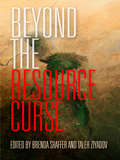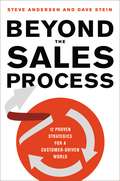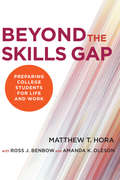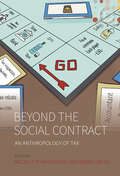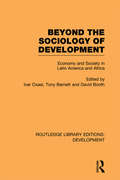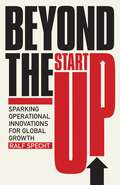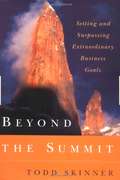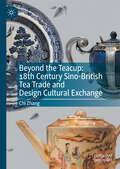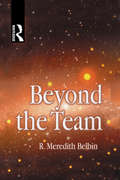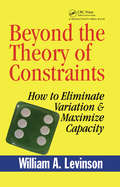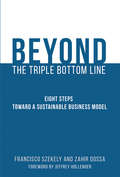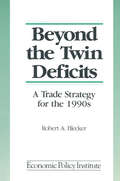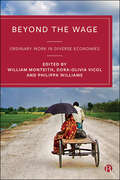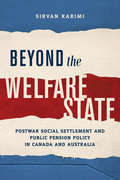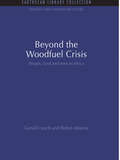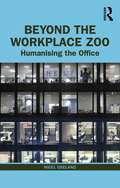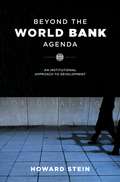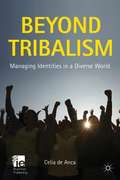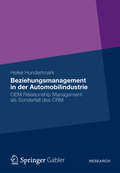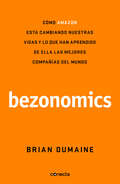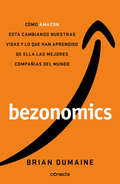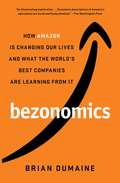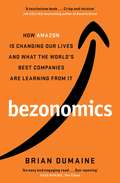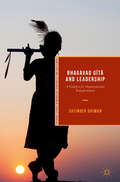- Table View
- List View
Beyond the Resource Curse
by Brenda Shaffer Taleh ZiyadovWhen countries discover that they possess large deposits of oil and natural gas, the news is usually welcome. Yet, paradoxically, if they rely on their wealth of natural resources, they often set down a path of poor economic performance and governance challenges. Only a few resource-rich countries have managed to develop their economies fully and provide a better and sustainable standard of living for large segments of their populations. This phenomenon, known as the resource curse, is a core challenge for energy-exporting states. Beyond the Resource Curse focuses on this relationship between natural wealth and economic security, discussing the particular pitfalls and consistent perils facing oil- and gas-exporting states.The contributors to this volume look beyond the standard fields of research related to the resource curse. They also shed new light on the specific developmental problems of resource-rich exporting states around the globe, including Azerbaijan, Bahrain, Cambodia, East Timor, Iran, Norway, Russia, Trinidad and Tobago, the United Arab Emirates, and Venezuela.Policy makers and academics think of energy security solely in terms of the interests of energy importers. Beyond the Resource Curse shows that the constant volatility in energy markets creates energy security challenges for exporters as well.
Beyond the Sales Process: 12 Proven Strategies for a Customer-Driven World
by Steve AndersenThe average executive spends less than 5 percent of their time engaged in the buying of products and services. This means that in this post-recession business environment, sales professionals who focus solely on the moment of the sale have made a fatal miscalculation. Featuring instructional case studies from companies including Hilton Worldwide, Merck, and Siemens, this evidence-based book provides readers with a proven methodology for driving success before, during, and after every sale. Embracing the entire customer life cycle, Beyond the Sales Process reveals 12 essential strategies, including: Research your customer Build a vision with them for their own success Understand your customers' drivers, objectives, and challenges Effectively position and differentiate Create and realize value together Leverage your results to forge lasting--and mutually beneficial--relationships Reinforced by research from Aberdeen Group, SAMA, ITSMA, and other experts, this book will help you to grow with your customers--and take your sales performance to a whole new level.
Beyond the Skills Gap: Preparing College Students for Life and Work
by Matthew T. Hora2018 Frederic W. Ness Book Award, AAC&U How can educators ensure that young people who attain a postsecondary credential are adequately prepared for the future? Matthew T. Hora and his colleagues explain that the answer is not simply that students need more specialized technical training to meet narrowly defined employment opportunities. Beyond the Skills Gap challenges this conception of the &“skills gap,&” highlighting instead the value of broader twenty-first-century skills in postsecondary education. They advocate for a system in which employers share responsibility along with the education sector to serve the collective needs of the economy, society, and students. Drawing on interviews with educators in two- and four-year institutions and employers in the manufacturing and biotechnology sectors, the authors demonstrate the critical importance of habits of mind such as problem solving, teamwork, and communication. They go on to show how faculty and program administrators can create active learning experiences that develop students&’ skills across a range of domains. The book includes in-depth descriptions of eight educators whose classrooms exemplify the effort to blend technical learning with the cultivation of twenty-first-century habits of mind. The study, set in Wisconsin, takes place against the backdrop of heated political debates over the role of public higher education. This thoughtful and nuanced account, enriched by keen observations of postsecondary instructional practice, promises to contribute new insights to the rich literature on workforce development and to provide valuable guidance for postsecondary faculty and administrators.
Beyond the Social Contract: An Anthropology of Tax (Studies in Social Analysis #15)
by Nicolette Makovicky and Robin SmithTax and taxation are conventionally understood as the embodiment of social contract. This ground-breaking collection of essays challenges this truism, examining what tax might tell us about the limits of social-contract thinking. The contributors shed light on contemporary fiscal structures and public debates about the moralities, practices, and imaginaries of tax systems, using tax to explore the nature of citizenship, personal freedom, and moral and economic value. Their ethnographically grounded accounts show how taxation may be influenced by spaces of fiscal sovereignty that exist outside or alongside the state, taking various forms, from alternative religious communities to economic collectives.
Beyond the Sociology of Development: Economy and Society in Latin America and Africa (Routledge Library Editions: Development)
by David Booth Tony Barnett Ivar OxaalConceived as a response to the economic naïvety and implicit metropolitan bias of many 1950s and 60s studies of ‘the sociology of development’ , this volume, first published in 1975, provides actual field studies and theoretical reviews to indicate the directions which a conceptually more adequate study of developing societies should take. Much of the book reflects strongly the influence of Andre Gunder Frank, but the contributors adopt a critical attitude to his ideas, applying them in empirical situations within such African and American countries as Kenya, Guyana, Tanzania and Peru. Others pursue the lines of enquiry opened up by Latin American theories of economic ‘dependency’ and by the new school of French economic anthropology.
Beyond the Startup: Sparking Operational Innovations for Global Growth
by Ralf SpechtThe greatest challenge of any startup and growth company is the transition from an early stage startup to a robust organization complete with a driving culture, contemporary leadership, organizational infrastructure and twenty-first-century operating methodologies. Ralf Specht provides inspiration, wisdom, and learnings gleaned from his role and experience in creating and scaling Spark 44, a Jaguar Land Rover joint venture, from concept to an award- winning global marketing communications company with well over a thousand employees in 18 countries in a few short years. In the high interest topic of startups focused on the beginning stages of entrepreneurship, Beyond the Startup fills a void in the entrepreneurial discussion on how to scale a second stage startup laying out, in practical terms, the tools and practices that made Spark44 a global powerhouse.
Beyond the Summit
by Todd SkinnerWorld-class rock climber Todd Skinner is also one of today's most sought-after motivational speakers for business audiences. Whenever he describes his history-making sixty-day free climb of the 20,500-foot Trango Tower in the Karakoram Himalayas (shown on the jacket), people are in awe of his stamina, skill, ambition, and determination. They are also eager to apply his lessons in their professional and personal lives. Skinner argues that everyone has a mountain to climb, whether it's meeting your annual sales target or launching a new product or getting your department to improve its teamwork. And he stresses that you should set your goals even higher than you normally would, and constantly look beyond the current summit to the next one. For instance, instead of aiming for 10 percent revenue growth, go after a seemingly impossible 50 percent target, and then think of new ways to get there. In both rock climbing and business, you must define your exact mission, assemble the right team, make the critical transition from preparation to action, have courage when crossing difficult terrain, and weather the storms well. Skinner offers fresh insights into all of these topics and explains principles such as: how you think is more important than what you know pick teammates for what they will do, not what they have already done make decisions in answer to the mountain fall toward the summit see each challenge as part of a bigger picture, your lifelong ascent Beyond the Summit presents fresh and inspiring advice on leadership, teamwork, and decision-making skills, combined with an epic adventure tale.
Beyond the Teacup: 18th Century Sino-British Tea Trade and Design Cultural Exchange
by Chi ZhangThis book focuses on tea-ware design exchanges between China and the UK since the middle of 17th Century, and explores how design encouraged trade and how the market demand influenced the development of design. The spirit of Chinese tea came to Britain alone with tea itself, and enriched the design of tea-ware, as well as British tea culture. During this process, tea-related oriental aesthetics evolved into an aesthetic image mechanism and developed as aesthetic concept, which infiltrated from private space to social space.
Beyond the Team
by R Meredith BelbinAn internationally renowned author offers an overview of how people and jobs can best be connected in a new era. 'Beyond the Team' draws on Meredith Belbin's extensive work with organizations worldwide to give further insights into the workings of teams and groups. The modern job needs to be actively interpreted and constantly revised in terms of the balance between a team role, a work role and a professional role. The increasingly complex demands of modern jobs can be aided by a colour system as tested in international trials. A colour based top down, bottom up form of communication creates sensitive feedback with a special value where members of a workforce do not share common language. The socially complex nature of communication about work in a new era offers parallels with the intricacies of the social insect world. Information technology is extending human networking with the potential of creating a form of organization closer to what can be achieved in superorganisms.'Beyond the Team' shows how eventually, the mature team can learn to distribute work between its own members by giving a comprehensive understanding of how to manage both team roles and work roles.
Beyond the Theory of Constraints: How to Eliminate Variation & Maximize Capacity
by William A. LevinsonThe basic principle of the Theory of Constraints (TOC) is the impossibility of running a balanced factory at 100 percent capacity. Variation in processing and material transfer times is the root cause of longer cycle times and higher inventories, which can hinder the ability to run a factory at full capacity.In Beyond the Theory of Constraints, William Levinson challenges this basic principle by stating that variation in processing and material transfer times comes from special or assignable causes that can be eliminated through traditional quality management techniques. Even random or common-cause variation can be suppressed through lean manufacturing methods. This compelling book: Gives a complete overview of the Theory of Constraints and its impact on engineering and managerial economicsIllustrates the effect of variation in processing and material transfer times, and shows why this variation prevents achievement of 100 percent utilizationDescribes methods for reducing variation in processing and material transfer timesDiscusses methods for increasing productivity and reducing cycle times - these are useful for elevating the constraint (increasing its capacity) and reduce variationThis book will teach business executives, managers, and technical professionals, including quality and manufacturing engineers, how to identify and remove variations and maximize capacity to achieve bottom-line results.
Beyond the Triple Bottom Line: Eight Steps toward a Sustainable Business Model (The\mit Press Ser.)
by Francisco Szekely Zahir DossaA pragmatic new business model for sustainability that outlines eight steps that range from exploring a mission to promoting innovation; with case studies.Many recent books make the case for businesses to become more sustainable, but few explain the specifics. In this book, Francisco Szekely and Zahir Dossa offer a pragmatic new business model for sustainability that extends beyond the traditional framework of the triple bottom line, describing eight steps that range from exploring a vision and establishing a strategy to implementing the strategy and promoting innovation.Szekely and Dossa argue that businesses and organizations need to move away from the business case for sustainability toward a sustainable business model. That is, businesses should go beyond the usual short-term focus on minimizing harm while maximizing profits. Instead, businesses on the path to sustainability should, from the start, focus on addressing a societal need and view profitability not as an end but as a means to support the sustainable organization.Szekely and Dossa explore key problems organizations face when pursuing a sustainability agenda. Each chapter presents one of the eight steps, describes a business dilemma for sustainability, provides a theoretically grounded strategic framework, offers case studies that illustrate the dilemma, and summarizes key findings; the case studies draw on the experiences of such companies as Tesla Motors, Patagonia, TOMs, and Panera. The book emphasizes leadership, arguing that leaders who question the status quo, inspire others, and take risks are essential for achieving sustainable business practices.
Beyond the Twin Deficits: A Trade Strategy for the 1990's (Economic Policy Institute Ser.)
by Robert A. BleckerThis study documents evidence of a decline trend in the international competitiveness of US industry. The analysis identifies three groups of countries that account for most of the US trade deficit in the 1980s: the surplus countries, Germany and Japan; the East Asian NICs; and the Latin American debtors. In each case the author points to underlying structural problems contributing to the deficit. They call for quite different US policy responses, including microeconomic and industrial policies, incentives to revive productivity, growth and technological innovation, import surcharges, wage increases in the NICs, currency realignments, US capital exports, and debt relief. A pragmatic policy approach, with efforts to open foreign markets, aims to achieve the greatest possible reduction in the trade deficit with the lowest possible cost from macroeconomic adjustments. The author urges the reversal of two adverse trends in his policy strategy: the decline in public sector investment and the decreasing progressivity of the tax code.
Beyond the Wage: Ordinary Work in Diverse Economies
by William Monteith, Dora-Olivia Vicol and Philippa WilliamsRecent developments in the organization of work and production have facilitated the decline of wage employment in many regions of the world. However, the idea of the wage continues to dominate the political imaginations of governments, researchers and activists, based on the historical experiences of industrial workers in the global North. This edited collection revitalises debates on the future of work by challenging the idea of wage employment as the global norm. Taking theoretical inspiration from the global South, the authors compare lived experiences of ‘ordinary work’ across taken-for-granted conceptual and geographical boundaries; from Cambodian brick kilns to Catalonian cooperatives. Their contributions open up new possibilities for how work, identity and security might be woven together differently. This volume is an invaluable resource for academics, students and readers interested in alternative and emerging forms of work around the world.
Beyond the Welfare State: Postwar Social Settlement and Public Pension Policy in Canada and Australia
by Sirvan KarimiNeoliberal calls for welfare state reforms, especially cuts to public pensions, are a contentious issue for employees, employers, and national governments across the western world. But what are the underlying factors that have shaped the response to these pressures in Canada and Australia? In Beyond the Welfare State, Sirvan Karimi utilizes a synthesis of Marxian class analysis and the power resources model to provide an analytical foundation for the divergent pattern of public pension systems in Canada and Australia. Karimi reveals that the postwar social contract in Australia was market-based and more conducive to the privatization of retirement income. In Canada, the social contract emphasized income redistribution that resulted in strengthening the link between the state and the citizen. By shedding light on the impact of national settings on public pension systems, Beyond the Welfare State introduces new conceptual tools to aid our understanding of the welfare state at a time when it is increasingly under threat.
Beyond the Woodfuel Crisis: People, land and trees in Africa (Energy and Infrastructure Set)
by Robin Mearns Gerald LeachPeople scratching a living from parched land, women walking miles for scraps of firewood are both familiar images of Africa. But, in many places, people, with the help of governments and aid agencies, are putting the land into good shape, growing more food and creating a healthy cover of trees. This book joins the �literature of hope� by looking at these advances from the viewpoint of the energy crisis of the poor. This crisis can only be solved by going beyond the narrow confines of energy to consider all the needs of local people and the potential for change. Drawing on a wide range of case histories, the authors describe the gains in farming and forestry � and woodfuel supply � that have come about through this broader, people-centered approach. They also write about woodfuel prices, markets and other key elements of survival strategies for the cities. Huge efforts will be needed to recover from the failures of the past, but Leach and Mearns show that important lessons are at last being learned and that new roads to success can be mapped. Originally published in 1988
Beyond the Workplace Zoo: Humanising the Office
by Nigel OselandThis book begins by outlining the common design mistakes with the modern open plan office and the industry focus on cost that has resulted in the ill-fated Workplace Zoo. The requirements of office-based workers according to psychological theory and research are then explained. Dr Oseland references historical studies in psychophysics to describe how to design environmental conditions (acoustics, lighting, temperature, indoor air quality) that enhance performance by supporting basic physiological needs. More contemporary research in environmental psychology investigates how cognition affects our interpretation and response to physical stimuli depending on personality, context, attitude and other personal factors. This in turn informs individual requirements for the environmental conditions as well as group needs. Studies in evolutionary psychology and biophilia are also referenced. The latter part of the book turns to workplace solutions and focuses on how to plan, design and manage offices to accommodate our innate human needs now and in the future. The importance of designing for inclusivity is also recognised, including accommodating cultural, gender and generational differences along with designing spaces for neurodiversity. Dr Oseland’s proposed workplace solution the Landscaped Office is a revived and revised version of Bürolandschaft with a contemporary twist. The impact of workplace trends, such as agile working and hot-desking, is also explored and found to complement the workplace solution, resulting in the Agile Landscaped Office. This book is key reading for professionals, and post-graduate students, in business, interior design, architecture, surveying, facilities management, building services engineering, HR and organisational or environmental psychology.
Beyond the World Bank Agenda: An Institutional Approach to Development
by Howard SteinDespite massive investment of money and research aimed at ameliorating third-world poverty, the development strategies of the international financial institutions over the past few decades have been a profound failure. Under the tutelage of the World Bank, developing countries have experienced lower growth and rising inequality compared to previous periods. In Beyond the World Bank Agenda, Howard Stein argues that the controversial institution is plagued by a myopic, neoclassical mindset that wrongly focuses on individual rationality and downplays the social and political contexts that can either facilitate or impede development. Drawing on the examples of Africa, Asia, Latin America, and transitional European economies, this revolutionary volume proposes an alternative vision of institutional development with chapter-length applications to finance, state formation, and health care to provide a holistic, contextualized solution to the problems of developing nations. Beyond the World Bank Agenda will be essential reading for anyone concerned with forging a new strategy for sustainable development.
Beyond tribalism
by Celia De AncaIn the past, neo-tribalism in a Western context has been feared as leading to blindness or irrationality. In today's business world, tribalism represents a conscious separation of the individual ego for the good of the community. This is the key to understanding the success of the most innovative businesses in the 21st century.
Beziehungsmanagement in der Automobilindustrie: OEM Relationship Management als Sonderfall des CRM
by Heike HundertmarkDie Motivation dieser Arbeit besteht darin, die Bedeutung des Beziehungsmanagement zwischen Automobilzulieferern und Automobilherstellern (sog. OEMs) in der aktuellen Marktsituation zu analysieren und in Bezug auf den Unternehmenserfolg der Zulieferer zu bewerten. Ziel der Arbeit ist es die wichtigsten Erfolgsfaktoren dieser Beziehung herauszustellen und die nicht direkt messbaren Beziehungseigenschaften zu quantifizieren und zu beurteilen. Die Konzeptualisierung eines branchenspezifischen OEM Relationship Management (ORM) Modells und dessen Einfluss- und Wirkungsfaktoren erfolgt konfirmatorisch. Aus den Ergebnissen der empirischen Studie lassen sich differenzierte Handlungsempfehlungen für deutsche, mittelständische Zulieferer im Bezug auf das ORM ableiten.
Bezonomics
by Brian DumaineCómo Amazon está cambiando nuestras vidas y lo que han aprendido de ellas las mejores compañías del mundo Una mirada profunda, reveladora e imparcial al modelo de negocio de Amazon que no sólo ha dominado el mundo, sino que lo está cambiando. Como Henry Ford con Ford, Sam Walton con Walmart, o Steve Jobs con Apple, Jeff Bezos y su Amazon son la historia de negocios de la década. El hombre más rico del planeta y el futuro primer trillonario del mundo ha construido una de las máquinas creadoras de riqueza más eficientes en la historia que representa el 2% del ingreso de Estados Unidos, gastado en cerca de 500 millones de productos enviados desde sus almacenes a 17 países. Amazon no sólo ha transformado completamente la industria de las ventas al menudeo y los servicios de almacenamiento enla nube, ahora sus tentáculos están ahorcando a los medios y a la publicidad, perturbando la tecnología, la economía, la creación de empleos y la sociedad como la conocemos. Su impacto es tal que los líderes de todos los sectores alrededor del mundo necesitan entender cómo opera este engrane. Basado en reportes sin precedentes de 150 fuentes de dentro y fuera de Amazon, Bezonomics revela los principios que Jeff Bezos utiliza para dominar los mercados -obsesión por el consumidor, innovación extrema, enfoque a largo plazo, inteligencia artificial- y muestra cómo los han tratado de replicar otras compañías en el mundo. Dumaine comparte las estrategias para probar tu negocio en Amazon y para competir con el gigante del retail, y, más importante, responde a una pregunta fundamental: ¿cómo Amazon y sus imitadores afectan el mundo en el que vivimos y qué podemos aprender de ellos? Una mina de oro para muchos, una amenaza para otros, el modelo Bezonomics se ha convertido en una fuerza modeladora de la vida que toda persona debe conocer para entender el presente y mirar hacia el futuro.
Bezonomics: How Amazon Is Changing Our Lives And What The World's Best Companies Are Learning From It
by Brian DumaineCómo Amazon está cambiando nuestras vidas y lo que han aprendido de ellas las mejores compañías del mundo Una mirada profunda, reveladora e imparcial al modelo de negocio de Amazon que no sólo ha dominado el mundo, sino que lo está cambiando. Como Henry Ford con Ford, Sam Walton con Walmart, o Steve Jobs con Apple, Jeff Bezos y su Amazon son la historia de negocios de la década. El hombre más rico del planeta y el futuro primer trillonario del mundo ha construido una de las máquinas creadoras de riqueza más eficientes en la historia que representa el 2% del ingreso de Estados Unidos, gastado en cerca de 500 millones de productos enviados desde sus almacenes a 17 países. Amazon no sólo ha transformado completamente la industria de las ventas al menudeo y los servicios de almacenamiento enla nube, ahora sus tentáculos están ahorcando a los medios y a la publicidad, perturbando la tecnología, la economía, la creación de empleos y la sociedad como la conocemos. Su impacto es tal que los líderes de todos los sectores alrededor del mundo necesitan entender cómo opera este engrane. Basado en reportes sin precedentes de 150 fuentes de dentro y fuera de Amazon, Bezonomics revela los principios que Jeff Bezos utiliza para dominar los mercados -obsesión por el consumidor, innovación extrema, enfoque a largo plazo, inteligencia artificial- y muestra cómo los han tratado de replicar otras compañías en el mundo. Dumaine comparte las estrategias para probar tu negocio en Amazon y para competir con el gigante del retail, y, más importante, responde a una pregunta fundamental: ¿cómo Amazon y sus imitadores afectan el mundo en el que vivimos y qué podemos aprender de ellos? Una mina de oro para muchos, una amenaza para otros, el modelo Bezonomics se ha convertido en una fuerza modeladora de la vida que toda persona debe conocer para entender el presente y mirar hacia el futuro.
Bezonomics: How Amazon Is Changing Our Lives and What the World's Best Companies Are Learning from It
by Brian DumaineAn in-depth, revelatory, and unbiased look at Amazon&’s world-dominating business model, the current competitors either imitating or trying to outfox Amazon, and the ways Bezonomics is shaping the life of every American consumer—from an award-winning Fortune magazine writer.Like Henry Ford, Sam Walton, or Steve Jobs in the early years of Ford, Walmart, and Apple, Jeff Bezos is the business story of the decade. Bezos, the richest man on the planet, has built one of the most efficient wealth-creation machines in history with 2% of US household income being spent on nearly 500 million products shipped from warehouses in seventeen countries. Amazon&’s business model has not only turned the retail industry and cloud computing inside out, but now its tentacles are squeezing media and advertising, and disrupting the state of technology, the economy, job creation, and society at large. Amazon&’s impact is so pervasive that business leaders in nearly every sector around the world need to understand how this force of nature operates. Based on unprecedented behind-the-scenes reporting from 150 sources inside and outside of Amazon, Bezonomics unveils the underlying principles Jeff Bezos uses to achieve his dominance—customer obsession, extreme innovation, and long-term management, all supported by artificial intelligence—and shows how these are being borrowed and replicated by companies across the United States, in China, and elsewhere. Brian Dumaine shares tips for Amazon-proofing your business. Most important, Bezonomics answers the fundamental question: How are Amazon and its imitators affecting the way we live, and what can we learn from them? A goldmine for some, and a threat for others, &“Bezonomics&” has become a life-shaping force both now and in the future that every American must know more about.
Bezonomics: How Amazon Is Changing Our Lives, and What the World's Companies Are Learning from It
by Brian DumaineAmazon is the business story of the decade. Jeff Bezos, the richest man on the planet, has built one of the most efficient wealth-creation machines in history. Like a giant squid, Amazon&’s tentacles are squeezing industry after industry and, in the process, upsetting the state of technology, the economy, job creation and society at large. So pervasive is Amazon&’s impact that business leaders in almost every sector need to understand how this force of nature operates and how they can respond to it. Saying you can ignore Jeff Bezos is equivalent to saying you could ignore Henry Ford or Steve Jobs in the early years of Ford and Apple. These titans monumentally changed how we do business, redefining the rules on a global scale. Amazon founder Jeff Bezos is the new disruptor on the block. He has created a 21st century algorithm for business and societal disruption. He has turned the retail industry inside out, is swiftly dominating cloud computing, media and advertising, and now has his sights trained on every other domain where money changes hands and business is transacted. But the principles by which Bezos has achieved his dominance - customer obsession, extreme innovation and long-term management, all supported by artificial intelligence turning a virtuous-cycle 'flywheel' - are now being borrowed and replicated. 'Bezonomics' is for some a goldmine, for others a threat, for still others a life-shaping force, whether they&’re in business or not.Brian Dumaine&’s Bezonomics answers the fundamental question: how are Amazon and its imitators affecting the way we live, and what can we learn from them?
Bhagavad Gītā and Leadership: A Catalyst for Organizational Transformation (Palgrave Studies in Workplace Spirituality and Fulfillment)
by Satinder DhimanThis book shows how the Bhagavad Gītā (part of the great Indian epic — the Mahābhārata) can be approached as a powerful tool for change management and as a catalyst for organizational transformation. It presents time-tested leadership strategies drawn from the Bhagavad Gītā that are relevant for today’s leaders. This book focuses on how to harmonize the needs of the individual with the needs of society, and by extension, how to harmonize the needs of employees and the organization. It employs an inside-out leadership development approach based on Self-knowledge and Self-mastery, the two highly important areas for practicing effective Self-leadership. The Gītā is a non-sectarian spiritual text with a universal message for living a life of meaning, purpose, and contribution and for leading from our authentic self. It shows how to manage oneself, as a necessary prelude to leading others. Students and organizational leaders will learn to integrate leadership function more effectively into all aspects at the individual, team, and institutional level.
Bharat Forge: Bringing Technology and Speed to the World Forging Market--A Profile of One of India's Pioneering Multinationals
by Nirmalya Kumar Pradipta K. Mohapatra Suj ChandrasekharIn the past decade, manufacturers in Eastern Europe, China, and Southeast Asia have established reputations for quality, reliability, and cost efficiency. But manufacturing-led, export-driven growth bypassed India...until now. Whereas Indian manufacturing has generally been associated with belching machines, clanking equipment, flooded mud roads, and unreliable power supplies, a few companies are emerging as contenders for domination of global markets after securing large chunks of the domestic market. One such company--Bharat Forge--has transformed itself from a basic manufacturer for domestic consumption into the second-largest forgings company in the world, with sales of more than $1 billion in 2007. This chapter provides an overview of the company and its quest to become the leader in the hypercompetitive, highly volatile market of parts manufacturing for global automotive manufacturers. This chapter is excerpted from "India's Global Powerhouses: How They Are Taking on the World."
